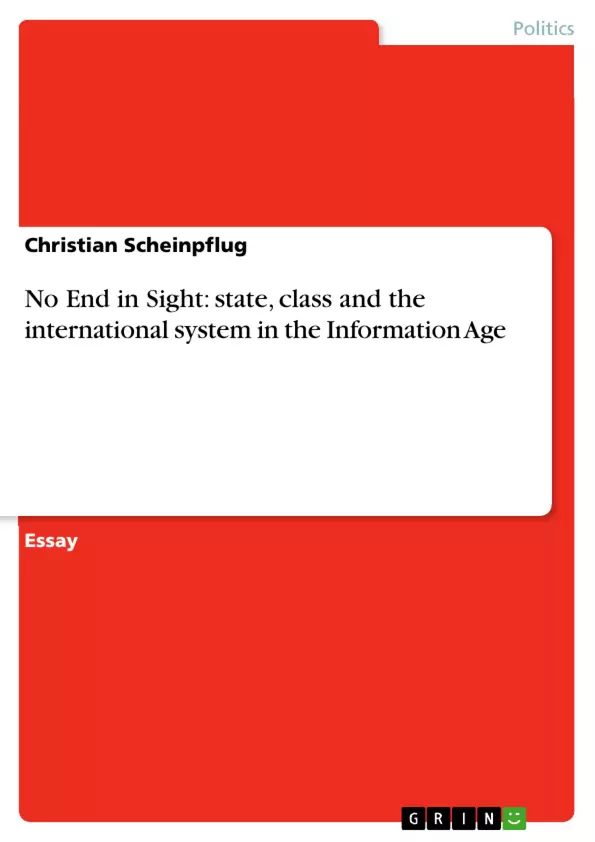The often abstract sounding term called ‘the international’ could be made better sense of if it is to be conceived of as a system. As such, it functions because socially organized entities (currently nation-states) are affected by mutual social interaction on political, socio-cultural, economic and technological levels. This kind of interaction among those entities, or more precisely, the seeds of current social order, can be traced back to pre-modern times, when agriculture facilitated settlement and communities formed as a consequence (Bromley and Brown, 2004, p. 3).
A key event in specific communal organisation is the rise of the sovereign nation-state, an outcome – most are convinced – of the Peace Treaty of Westphalia in 1648. This development was so successful that the sovereign social organisation of communities is still the most common form, and up to this day determines relations at all levels within the international system (Bromley and Brown, 2004, p. 3).
While the nation-state can claim authority to regulate domestic political life and social interaction, it lacks a comparable authority in the international realm. Any interactions – be they social, political or economic - among nation-states are therefore taking place in an anarchic, as opposed to a hierarchic, environment. In order to be able to analyse interaction among states, or simply put, international politics, a framework can be modeled that is informed by observations and abstractions, which are derived from actual and perished societies, represented as the “problematic of the international” (Bromley and Brown, 2004, p. 3). The problematic of the international also includes the studying of interaction of various socially organized entities (not merely nation-states) – so-called geopolitics - and so reveals agents, transforming characters and processes that are entangled with them within specific social orders (Bromley and Brown,2004, p. 12).
Various academic traditions approach the problematic of the international from different starting points, by assigning more or less importance to certain levels of interaction among socially organized communities. [...]
Inhaltsverzeichnis (Table of Contents)
- The International System: A Framework for Analysis
- The Rise of the Nation-State
- The Problematic of the International
- Academic Traditions and the Problematic of the International
- Globalization Theory: A Critical Perspective
- Globalization, Technology and the Network Society
- Globalization and the "Occupy" Movement
- The Role of the Nation-State in the Information Age
- The Information Age: A New Era of Change
- From Energy Intensive to Information Intensive Inputs
- The Impact of Information Technology on Production
Zielsetzung und Themenschwerpunkte (Objectives and Key Themes)
This essay critically examines the impact of globalization and information technology on the international system. It analyzes the role of networks in transforming social, political, and economic structures, while comparing Globalization Theory to other academic traditions such as neo-Realism and Marxism.- The rise of the nation-state and its implications for international relations
- The impact of technology on the international system, particularly the role of Information and Communication Technologies (ICTs)
- The emergence of networks as alternative forms of social organization
- The relationship between globalization and the state
- The transition from energy-intensive to information-intensive economies and its implications for international order
Zusammenfassung der Kapitel (Chapter Summaries)
The first chapter outlines the concept of the international system as a framework for understanding social interaction among nation-states and other social entities. It introduces the rise of the nation-state and the challenges it faces in a globalized world. The chapter also explores different academic traditions, including Realism, Marxism, Liberalism, and Constructivism, highlighting their perspectives on international relations.
The second chapter focuses on Globalization Theory and its critical analysis of the international system. It examines the impact of ICTs on the formation of identities, the emergence of networks, and the challenges to traditional power structures. This chapter explores the example of the Occupy movement and its role in demonstrating the potential of networks for political activism.
The third chapter delves into the Information Age and its transformative effects on society and the international system. It examines the shift from energy-intensive to information-intensive economies and the role of ICTs in shaping production, consumption, and global economic relations. The chapter highlights the importance of information access and its potential to challenge established power dynamics.
Schlüsselwörter (Keywords)
This essay focuses on the key concepts of the international system, globalization, information technology, networks, nation-states, and the Information Age. It also explores the role of academic traditions like neo-Realism, Marxism, and Globalization Theory in understanding the complexities of international relations.Frequently Asked Questions
What is the "problematic of the international" described in the text?
It refers to a framework modeled to analyze interactions among states in an anarchic environment, derived from observations of actual and historical societies.
How did the Peace Treaty of Westphalia impact the international system?
The treaty in 1648 led to the rise of the sovereign nation-state, which remains the most common form of social organization determining international relations today.
What role does Information Technology play in the Information Age?
ICTs are transforming production and social structures, shifting economies from energy-intensive to information-intensive inputs.
How does Globalization Theory view the role of networks?
Globalization Theory examines how networks challenge traditional power structures and enable political activism, as seen in the Occupy movement.
What is the difference between anarchic and hierarchic environments in international politics?
Nation-states have authority to regulate domestic life (hierarchic), but lack a central authority in the international realm, making global interactions anarchic.
- Citation du texte
- Christian Scheinpflug (Auteur), 2012, No End in Sight: state, class and the international system in the Information Age, Munich, GRIN Verlag, https://www.grin.com/document/199311



